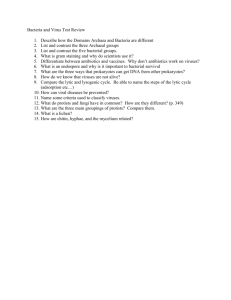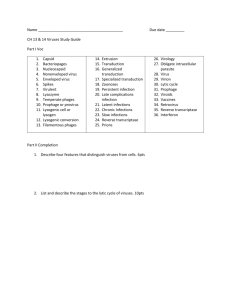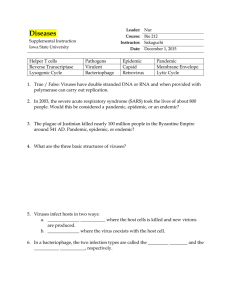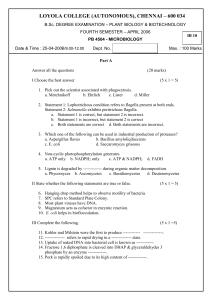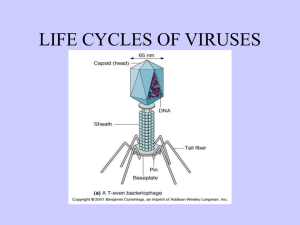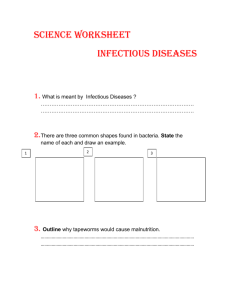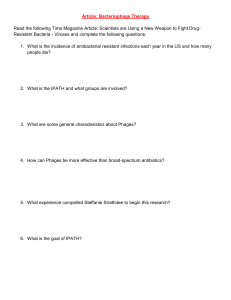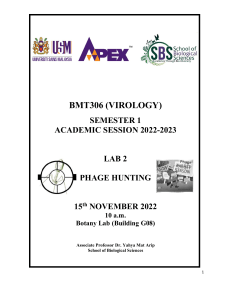LOYOLA COLLEGE (AUTONOMOUS), CHENNAI – 600 034
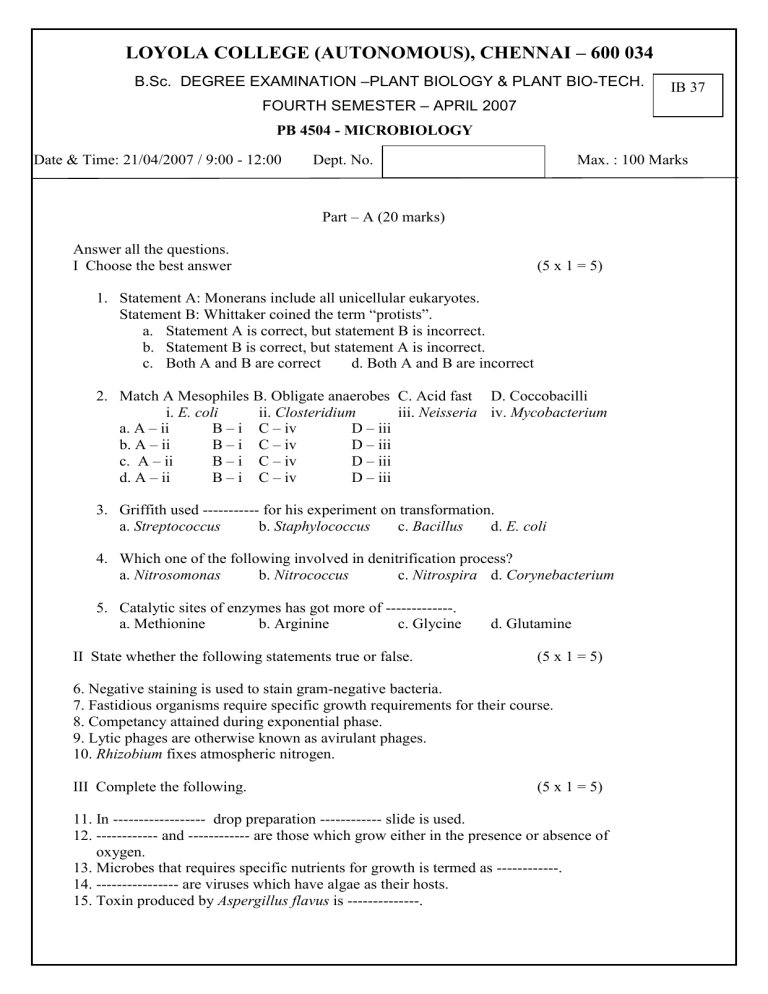
LOYOLA COLLEGE (AUTONOMOUS), CHENNAI – 600 034
B.Sc. DEGREE EXAMINATION
–PLANT BIOLOGY & PLANT BIO-TECH.
FOURTH SEMESTER
– APRIL 2007
PB 4504 - MICROBIOLOGY
Date & Time: 21/04/2007 / 9:00 - 12:00 Dept. No.
IB 37
Max. : 100 Marks
Part – A (20 marks)
Answer all the questions.
I Choose the best answer (5 x 1 = 5)
1.
Statement A: Monerans include all unicellular eukaryotes.
Statement B: Whittaker coined the term “protists”. a.
Statement A is correct, but statement B is incorrect. b.
Statement B is correct, but statement A is incorrect. c.
Both A and B are correct d. Both A and B are incorrect
2.
Match A Mesophiles B. Obligate anaerobes C. Acid fast D. Coccobacilli i. E. coli a. A – ii ii. Closteridium
B – i C – iv D – iii iii. Neisseria iv. Mycobacterium b. A – ii c. A – ii
B – i C – iv
B – i C – iv
D – iii
D – iii d. A – ii B – i C – iv D – iii
3.
Griffith used ----------- for his experiment on transformation. a. Streptococcus b. Staphylococcus c. Bacillus d. E. coli
4.
Which one of the following involved in denitrification process? a. Nitrosomonas b. Nitrococcus c. Nitrospira d. Corynebacterium
5.
Catalytic sites of enzymes has got more of -------------. a. Methionine b. Arginine c. Glycine d. Glutamine
II State whether the following statements true or false. (5 x 1 = 5)
6. Negative staining is used to stain gram-negative bacteria.
7. Fastidious organisms require specific growth requirements for their course.
8. Competancy attained during exponential phase.
9. Lytic phages are otherwise known as avirulant phages.
10. Rhizobium fixes atmospheric nitrogen.
III Complete the following.
11. In ------------------ drop preparation ------------ slide is used.
(5 x 1 = 5)
12. ------------ and ------------ are those which grow either in the presence or absence of
oxygen.
13. Microbes that requires specific nutrients for growth is termed as ------------.
14. ---------------- are viruses which have algae as their hosts.
15. Toxin produced by Aspergillus flavus is --------------.
IV Answer the following each within 50 words.
16. Mention the contributions of each of the following scientists: a. Lister b. Lederberg c. Ehrlich d. Jenner
17. What are gas vacuoles? What is their function?
18. Differentiate coenzyme and cofactors.
19. Distinguish between icosahedral and helical viruses.
20. What is bioflocculation?
(5 x 1 = 5)
Part – B
Answer any FIVE of the following, each not exceeding 350 words. Draw necessary diagrams.
(5 x 8 = 40)
21. Tabulate the differences between prokaryotes and eukaryotes.
22. Classify bacteria based on shape and arrangement.
23. Write about the cultivation of viruses.
24. Expand the following with a foot note each. a. PPLO b. Ag – ab c. Taq d. nm e. TMV
25. Compare cyclic and non-cyclic photophosphorylation in phototrophs.
26. Briefly explain the mechanism of bacterial transformation.
27. Explain phosphorous cycle. Add note on the roles of VAM in agriculture.
28. Outline the protocol for industrial production of vinegar.
Part – C e. CPE
Answer the following, each not exceeding 1500 words. (2 x 20 = 40)
29.
(a) What are pure cultures? Discuss the methods of isolation of pure cultures.
Or
(b) Give an account of lytic cycle. How does it differ from lysogenic cycle?
30. (a) With the outline explain in detail about the pentose phosphate pathway.
Or
(b) Give an account on microbial food spoilage. Explain the methods of food
preservation.
******
